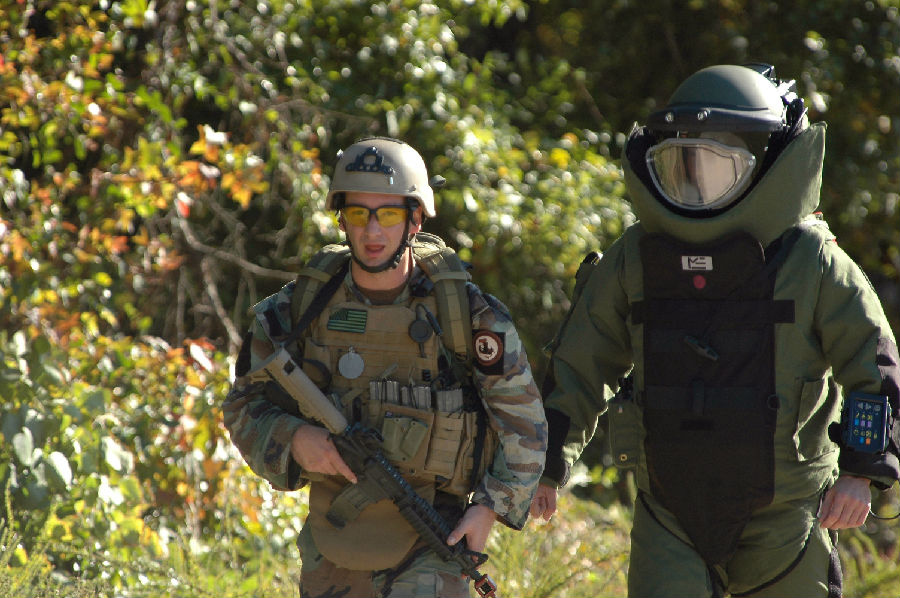JUDY WOODRUFF: One of the most stressful jobs in the military belongs to members of the Explosive Ordnance Disposal unit, or EOD. In this week's Brief But Spectacular episode, in honor of Veterans Day, three female former EOD members now with the Boulder Crest Retreat in Arizona, a facility that specializes in post-traumatic growth, talk about their experiences and their recovery.
JUDY ELLIS, U.S. Veteran: I was diagnosed with PTSD in 2004. They gave me the pills and said, vaya con dios.
TIANA STRAUB, U.S. Veteran: That's just what we keep telling us, is that we have PTSD, and it's not curable, and that they can just help us manage it.
JAMIE MCCRARY, U.S. Veteran: I just didn't have the courage to tell anybody that I was struggling, until it just got to a point that I just couldn't hold it in anymore, and I would just, I was crying every day, and I don't even know what I was crying about.
TIANA STRAUB: Went in and wanted to be a medic, actually. And they had no medics slots open. So, I was like, well, let's see what you have. One of the first things that popped up was EOD. I asked them, like, what's EOD? And he explained that we work with robots, we work with explosives. He is like, it's pretty much like bomb squad for the military. And I was like, so, I can do that, even if I'm a girl? And he's like, yes.
JAMIE MCCRARY: What they try to impress upon you is that one little mistake, even though it doesn't seem very large, could cost you your life.
JUDY ELLIS: When I was an EOD tech, they didn't have bomb suits or robots. You just had to walk up and engage. At the time I joined the Marine Corps, it was 2 percent female, you know, but they didn't want any of us. We were congressional nuisance, and you consistently had to be proving yourself.
JAMIE MCCRARY: I mean, the male-to-female ratio in the military is already pretty imbalanced, and then, in EOD, even more so.

TIANA STRAUB: Boys will be boys. Sometimes, the things that entertain them are, I can't say that on camera.
JAMIE MCCRARY: It made me a tougher person. But and then it also made me this closed-off person that I eventually became.
JUDY ELLIS: I did 20 years in the Marine Corps. And so, after 20 years, you're kind of institutionalized. So then I had to transition into, what am I going do next?
JAMIE MCCRARY: It was such a strange transition for me, to go from living a life that was so structured, and I didn't really have to think about much. It was just, do your job, go home, wash, rinse, repeat, do it again. And then, all of a sudden, I step out into the civilian world, and I'm back to just being Jamie.
TIANA STRAUB: I had three spine surgeries after I got out of, got back from my deployment. And that was really hard for me. And so I got very depressed.
JAMIE MCCRARY: Just waking up in the morning and mustering the strength to just get out of bed to go to work, that was all I was, that's all I was capable of doing.
JUDY ELLIS: When you have more time and you're more solitude and you think to yourself, then all this stuff starts coming up. And I realized, I said realizing, I need help.
TIANA STRAUB: The PATHH program was actually the first place they told us that there's nothing wrong with us, that any sort of traumatic experience you had could be used as an opportunity to grow.
JUDY ELLIS: They have a slogan here. It's: It's not you, it's just what happened. When I first got here, and I saw, I don't cry about anything, but I haven't seen an EOD woman since 1981. I literally cried because I was like, they're really here. They do exist, these other EOD women that have struggles and issues.
TIANA STRAUB: While we have been here in Arizona, in the PATHH program, we got to do equine therapy. They told us that horses will reflect your emotions.
JUDY ELLIS: I'm up there, and I'm Jane Wayne. But then, when I was able to calm down, I'm like, yes. The big horse is not a bomb. It's not going to hurt you. You can just be, go up and be gentle, and the whole idea of not everything in life is going to hurt you.
JAMIE MCCRARY: For me, it was just forgiving people who have done me wrong and forgiving myself for allowing myself to just get to this point of just absolute hatred of who I am. And that's what I'm working on.
JUDY ELLIS, U.S. Veteran: My name is Judy Ellis.
TIANA STRAUB: My name is Ti.
JAMIE MCCRARY: My name is Jamie McCrary, and this is my Brief But Spectacular take...
JUDY ELLIS: ... on post-traumatic growth.
JUDY WOODRUFF: Very tough to watch. And you can find additional Brief But Spectacular eisodes on our Web site. That's PBS.org/NewsHour/Brief.












